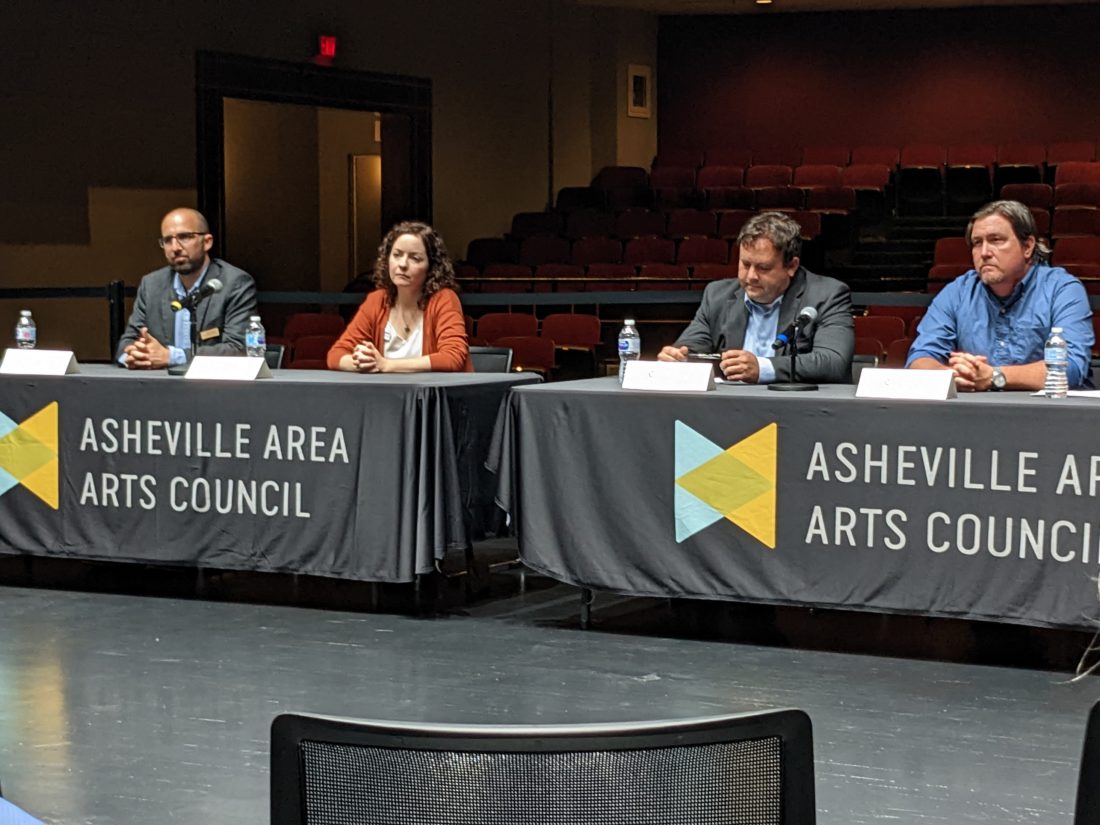Caleb Rudow has a very particular set of skills that set him apart from his fellow legislators: As far as the House District 114 representative knows, he’s the only member of the N.C. General Assembly who’s also the lead singer in a David Bowie cover band.
This and other artistic revelations were shared on Sept. 7 during the first of three Arts AVL Town Halls that the Asheville Area Arts Council will host over the next month. Joining Rudow on the Diana Wortham Auditorium stage were candidates running for District 114 — Democrat Eric Ager and Republican Everett Pittillo — and Lindsey Prather, the Democratic candidate for District 115. Rudow, who was appointed by Gov. Roy Cooper to replace Susan Fisher after her retirement, is running to represent District 116.
Warren Daniel (Republican, Senate District 46), John Anderson (Republican, Senate District 49), Julie Mayfield (Democrat, Senate District 49), Pratik Bhakta (Republican, House District 115) and Mollie Rose (Republican, House District 116) were also invited but did not participate.
Following an introduction by AAAC Executive Director Katie Cornell and an overview of the local creative sector’s economic impact, the four candidates were asked questions by AAAC Arts Coalition chairs Rae Geoffrey and Laura Mitchell that centered on arts funding at the state level.
All except Prather — a Wake County native who stayed in Buncombe County after graduating from UNC Asheville — grew up in the Asheville area. But she and her fellow candidates commented throughout the hourlong event on the arts being a cornerstone of the city’s identity and one that merits additional financial support to grow that legacy.
“It’s the essence of Asheville. It generates revenue. It’s been here since I can remember — since I could walk,” Pittillo said. “So many people say, ‘Well, that’s just art. They don’t need that money. They don’t need that help.’ But it’s what inspires imagination.”
Regarding the state’s role in the creative sector’s ongoing recovery from the COVID-19 pandemic, Pittillo is in favor of tax breaks to bring film productions back to Western North Carolina and stimulate the economy. Prather supports a third phase of the Business Recovery Grant — phase 2 recently concluded — and, referencing her years as a U.S. History teacher, noted that funding arts is part of the country’s traditions and history.
“All of our big federal funding programs included investments in the arts — the New Deal; the Great Society,” Prather said. “We’ve always recognized how important it is to invest in our arts, especially when we’re in times of recovery.”
Calling artists “essential workers” who helped others get through the hard times of the pandemic, Rudow cited “big picture pieces” like affordable housing and Medicaid expansion so that creators don’t get priced out of Asheville.
Subsequent questions addressed the importance of arts education, including growing the number of the state’s A+ Schools, which use a whole-school transformation model that views the arts as fundamental to teaching and learning, and supporting Senate Bill 681, which requires all North Carolina high schoolers to complete one arts course before graduating.
“We’ve got to make sure that we maintain funding for those programs, even when resources are scarce,” Ager said. “It’s those students who get an artistic, creative education who are going to solve the world’s biggest challenges. They’re the ones who are going to solve the problems of engineering and architecture and medicine. It’s that outside-the-box thinking that art encourages.”
All four candidates are also in favor of increasing N.C. Arts Council grant funding, with Prather and Pittillo noting the importance of working with constituents to identify priority needs on a local level. Every candidate also found common ground on investing in arts manufacturing within the region, with several participants pointing to its bipartisan appeal and the higher quality of locally made products, the purchase of which keeps revenue within the community.
The event’s final question concerned whether establishing a WNC Museum of History and Culture would be a good use of state funds. All again agreed on such distribution, with Prather stressing that nonalcohol-centric cultural resources would encourage more families to relocate to the area; Rudow pointed out that the museum is a pet project of Ager’s father, John Ager, who is not seeking reelection for a fifth term representing District 115.
Audience questions were collected throughout the event via an online form, but while none of the candidates exceeded their allotted two minutes per answer, not enough time remained to incorporate attendee suggestions. Cornell noted that future series installments would be modified in order to make sufficient room for audience participation.
The Arts AVL Town continues Wednesday, Sept. 28, with Buncombe County commissioner candidates, and Wednesday, Oct. 12, with Asheville mayor and City Council candidates. Both events are free to attend, but registration is required. To learn more, visit avl.mx/af1.




Before you comment
The comments section is here to provide a platform for civil dialogue on the issues we face together as a local community. Xpress is committed to offering this platform for all voices, but when the tone of the discussion gets nasty or strays off topic, we believe many people choose not to participate. Xpress editors are determined to moderate comments to ensure a constructive interchange is maintained. All comments judged not to be in keeping with the spirit of civil discourse will be removed and repeat violators will be banned. See here for our terms of service. Thank you for being part of this effort to promote respectful discussion.